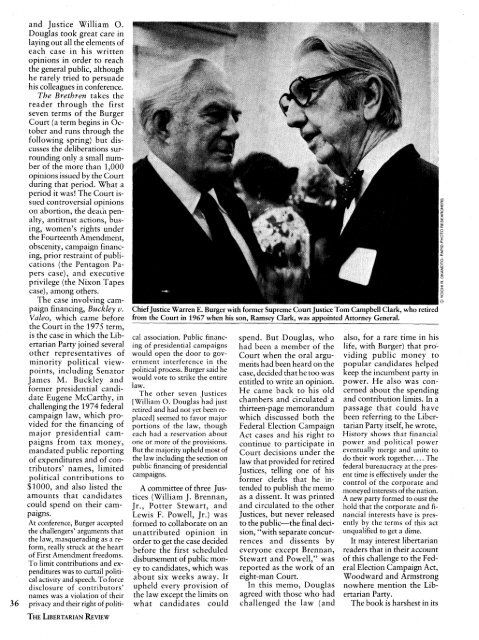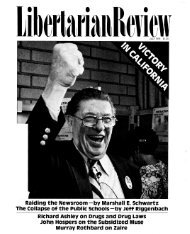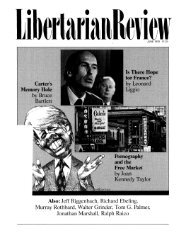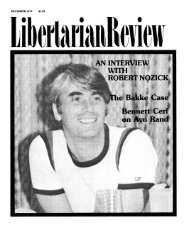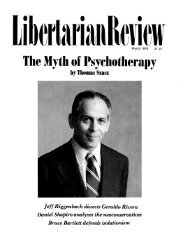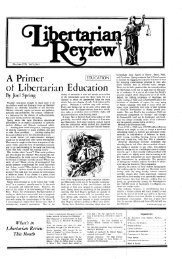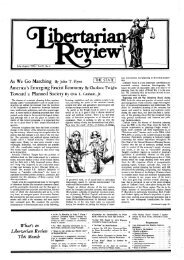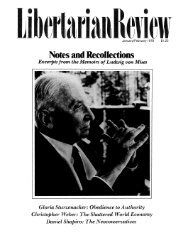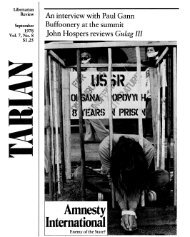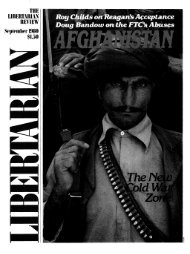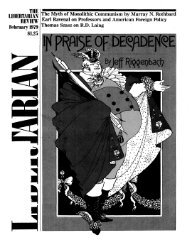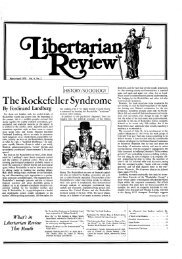36and Justice William O.Douglas took great care inlaying out all the elements ofeach case in his writtenopinions in qrder to reachthe general public, althoughhe rarely tried to persuadehis colleagues in conference.<strong>The</strong> Brethren takes thereader through the firstseven terms of the BurgerCourt (a term begins in Octoberand runs through thefollowing spring) but discussesthe deliberations surroundingonly a small numberof the more than 1,000opinions issued by the Courtduring that period. What aperiod it was! <strong>The</strong> Court issuedcontroversial opinionson abortion, the death penalty,antitrust actions, busing,women's rights underthe Fourteenth Amendment,obscenity, campaign financing,prior restraint of publications(the Pentagon Paperscase), and executiveprivilege (the Nixon Tapescase), among others.<strong>The</strong> case involving campaignfinancing, Buckley v.Valeo, which came beforethe Court in the 1975 term,is the case in which the <strong>Libertarian</strong>Party joined severalother representatives ofminority political viewpoints,including SenatorJames M. Buckley andformer presidential candidateEugene McCarthy, inchallenging the 1974 federalcampaign law, which providedfor the financing ofmajor presidential campaignsfrom tax money,mandated public reportingof expenditures and of contributors'names, limitedpolitical contributions to$1000, and also listed theamounts that candidatescould spend on their campaigns.At conference, Burger acceptedthe challengers) arguments thatthe law, masquerading as a reform,really struck at the heartof First Amendment freedoms.To limit contributions and expenditureswas to curtail politicalactivity and speech. To forcedisclosure of contributors)names was a violation of theirprivacy and their right ofpoliti-THE LIBERTARIAN REVIEWChiefJustice Warren E. Burger with former Supreme CourtJustice Tom Campbell Clark, who retiredfrom the Court in 1967 when his son, Ramsey Clar~, was appointed Attorney General.cal association. Public financingof presidential campaignswould open the door to governmentinterference in thepolitical process. Burger said hewould vote to strike the entirelaw.<strong>The</strong> other seven Justices[William O. Douglas had justretired and had not yet been replaced]seemed to favor majorportions of the law, thougheach had a reservation aboutone or more of the provisions.But the majority upheld most ofthe law including the section onpublic financing of presidentialcampaigns.A committee ofthree Justices(William J. Brennan,JL, Potter Stewart, andLewis F. Powell, JL) wasformed to collaborateIon anunattributed opinion inorder to get the case decidedbefore the first scheduleddisbursement of public moneyto candidates, which wasabout six weeks away. Itupheld every provision ofthe law except the limits onwhat candidates couldspend. But Douglas, whohad been a member of theCourt when the oral argumentshad been heard on thecase, decided that he too wasentitled to write an opinion.He came back to his oldchambers and circulated' athirteen-page memorandumwhich discussed both theFederal Election CampaignAct cases and his right tocontinue to participate inCourt decisions under thelaw that provided for retiredJustices, telling one of hisformer clerks that he intendedto publish the memoas a dissent. It was printedand circulated to the otherJustices, but never releasedto the public-the final decision,"with separate concurrencesand dissents byeveryone except Brennan,Stewart and Powell," wasreported as the work of aneight-man Court.In this memo, Douglasagreed with those who hadchallenged the law (andalso, for a rare time in hislife, with Burger) that p rd~viding public money topopular candidates helpedkeep the incumbent party inpower. He also was concernedabout the spendingand contribution limits. In apassage that could havebeen referring to the <strong>Libertarian</strong>Party itself, he wrote,History shows that financialpower and political powereventually merge and unite todo their work together.... <strong>The</strong>federal bureaucracy at the presenttime is effectively under thecontrol of the corporate andmoneyed interests ofthe nation.A new party formed to oust thehold that the corporate and financialinterests have is presentlyby the terms of this actunqualified to get a dime.It may interest libertarianreaders that in their accountof this challenge to the FederalElection Campaign Act,Woodward and Armstrongnowhere mention the <strong>Libertarian</strong>Party.<strong>The</strong> book is harshest in its
Bob Woodward, now managing editor of <strong>The</strong>· Washington Postand co-author with Scott Armstrong of <strong>The</strong> Brethren.picture ofChiefJustice WarrenBurger. <strong>The</strong> authors employa fictionalized form ofnarrative in which they attributethoughts and reactionsto all the Justices, includingBurger, whom theydefinitely state they never,interviewed. <strong>The</strong>re is no wayforrhe reader to disentangleinformation they gained offthe record from the authors'personal evaluations - orfrom the evaluations of abiased employee, for thatmatter. Whatever the sources,Burger is presented as astupid, incompetent, uninformed,highhanded man,with an almost paranoidfear that the confidentialityof the Court will be violated(Not so paranoid, as theexistence of this book attests).Business Week summarizedthe impression thebookgives by illustrating itsreview with a cartoon thatshows all the Justices readingcopies of <strong>The</strong> Brethren,but Warren Burger is holdinghis copy upside down.Sometimes the anecdotesthat illustrate this view ofBurger seem to have a ring oftruth to them, as whenBurger is described as respondingto the news fromthe Court carpenter that thechair being preparedfor JusticeJohn Paul Stevens won'tbe ready for his swearing:-inceremony by saying, "I haveruled that it will be done ontime."On the other hand, manyof them are examples of thepresumption of the authorsin going inside their subjects'heads: Thurgood Marshall"had always seen Burgeras an inappropriate caretakerof a seat that had belongedto a man of the statufeof Earl Warren." Douglas"despised" Burger. In theeyes of Potter Stewart,Burger"was a product ofRichard Nixon's tastelessWhite House, distinguishedin appearance and bearing,but without substance or integrity.Burger was abrasiveto his colleagues, persistentin ignorance, and, worst·ofall, intellectually dishonest."And "It was not just theChief's intellectual inadequaciesor his inability towrite coherent opinions thatbothered Powell. <strong>The</strong>re wassomething overbearing and'offensive about the Chief'sstyle."It is clear that the bookhas somewhat of a doublestandard in Chief Justices.<strong>The</strong> liberal Earl Warrenemerges as a man of "stature"who "led a judicialrevolution that reshapedmany social and political relationshipsin America."While Burger's "intellectualinadequacies" are reportedby the authors as botheringhis colleagues, Earl Warren'sdeficiencies are reportedin quite a differentway: "Warren was not anabstract thinker, nor was hea gifted scholar. He was·more interested in the basicfairness ofdecisions than thelegal rationales."And whereas Burger's"inability to write coherentopinions" is repeatedlystressed, it turns out that therevered Earl Warren hadavoided such criticism bynever writing the opinionsthat appeared under hisname-he delegated that jobto his law clerks. "Warrentold them how he wantedthe cases to come out. Butthe legal research and thedrafting of Court opinions-even those that had madeWarren and his Court famousand infamous-weretheir domain."Similarly, much is madeof Burger's attempts to controlthe assigning of opinionsby making sure that heis on the side of the majorityin the case conferences.This, it is indicated, is anunworthy way of influencingthe direction of theCourt. But under Earl Warren,"It had been Brennanwho had sat each Thursdaywith Warren preparing anorchestration for the Fridayconference." 'Well, guys, it's all takencare of,' Brennan often toldhis clerks after the sessionswith Warren. With votesfrom Fortas, Marshall, andusually Douglas, Brennanrarely failed to put togethera majority." <strong>The</strong> view is attributedto Justice John M.Harlan that, as a result ofthese strategy sessions, therewas a sense "at times underWarren, that the debate wasa sham."One of the most interestingand little-known aspectsof the functioning of theCourt which is revealed bythis book is the role of theJustices' clerks. It is rare fora Justice to delegate as muchto his clerks as Warren reportedlydid, but it appearsto be routine for clerks towrite the first drafts of theopinions which the Justicescirculate among themselves."We may have to dissent,"Stewart tells his clerk."Your thing may be publishedyet" Harlan's clerksnormally wrote his firstdrafts, although he wasknown in his day as "theCourt's most prolific writer."Byron W. White raceshis clerks to see if he or theycomplete a first draft. Oneof Burger's clerks in the1972 term is described as "atalented translator of theChief's visceral reactionsinto reasoned legal positions"(Note the differencein tone between this descriptionand the description ofWarren and his clerks citedearlier). Only Douglas appearsto have written everythinghimself, and even toldEric Severeid in an interviewthat the Court doesn't needlaw clerks- he would bewilling to do all the lookingup of precedents himself, astatement much doubted bythe tired clerks workinglate in his office. Once, whena clerk re<strong>org</strong>anized one ofhis drafted opinions, Douglascalled him in and said, "Ican see you've done a lot ofwork, but you are off basehere. If and when you getappointed to the SupremeCourt you can write opin-MARCH <strong>1980</strong>37
- Page 6 and 7: 6of which Taraki and Aminwere membe
- Page 8 and 9: succession of client regimesinKabul
- Page 10 and 11: ~\~~,{AP!10Of windfallsand bailouts
- Page 12 and 13: 12JEFFREY SANCHEZ& ROYA. CHILDS,jR.
- Page 14: JEFF RIGGENBACHThere is a serious p
- Page 18 and 19: ~nwdrl~~O/hood [which] implies an a
- Page 20 and 21: 20fully reflect the old-the English
- Page 22 and 23: 22better with his essays in prose.
- Page 24 and 25: and Ann Radcliffe. And, as was the
- Page 26 and 27: "Obviously, they did not always tak
- Page 28 and 29: Let us con'sider, briefly, one case
- Page 30 and 31: 30Norman PodhoretzMarchinginstep'RO
- Page 32 and 33: 32nism and Its Friends,"by Walter L
- Page 34 and 35: in Commentary one of themost loaths
- Page 38 and 39: 38ions as you choose."The statement
- Page 40 and 41: 40gone on for generations, asthe fo
- Page 42 and 43: 42see what I haddone, and thepressu
- Page 44 and 45: 44thors have a serious problem.Can
- Page 46 and 47: 46tion novel, .an attempt toportray
- Page 48 and 49: 48the Russian Embassy by thewife of
- Page 50 and 51: 50CLASSIFIED ADVERTISEMENTS are acc
- Page 52: LAISSEZ FAIRE BOOKSlibertarianRevie


